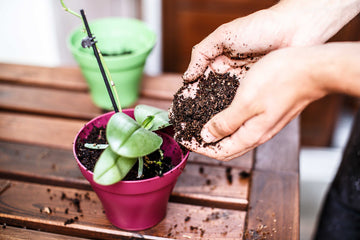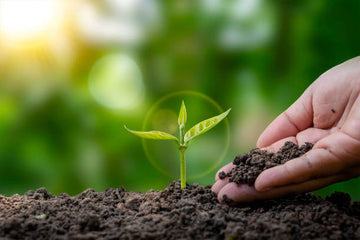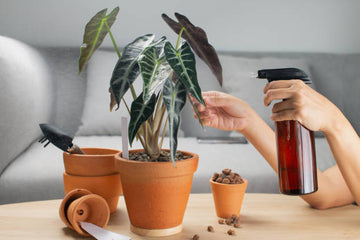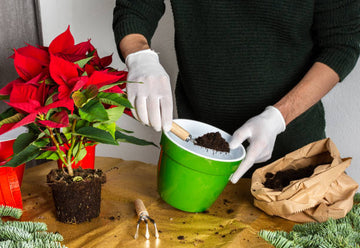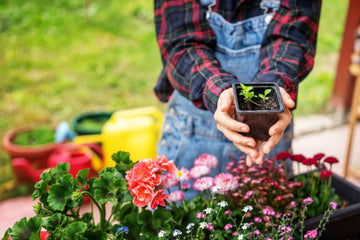Houseplants are a great way to add color and life to your home, especially if you don’t have a big yard or outdoor space. They can also be a beautiful decor element when paired with stylish planters. However, the Potted houseplants don’t get a constant supply of nutrients from the soil.
Over time, the nutrients in the soil can get used up, which can cause your plants to suffer. By fertilizing your houseplants, you can help them stay healthy and happy.

Why Fertilizer Matters?
Always plants need a balanced diet of nutrients to grow well, just like us. The best Fertilizers provide essential elements like nitrogen, phosphorus, and potassium, which help with growth, blooming, and overall health. It will give your plant what soil can't, that is a boost of nutrients on demand. It’s more important to learn how often to fertilize indoor plants and which fertilizer to choose.
Fertilizer can be used to improve poor soil conditions and give slow-growing plants what they need to thrive. Remember that houseplants are different from outdoor plants, which get their nutrients from dead leaves and other organic matter around them. Indoor plants are limited to the amount of sunlight, water, and nutrients that they are given by the person taking care of them. That’s why it’s important to give the best fertilizer for indoor plants in the right amounts.
When should you Feed Fertilizer:
Most of the best indoor plants need a regular dose of good fertilizer, but the amount depends on the type of houseplant you have and the kind of potting soil it’s living in.
The indoor plants need water to survive. If they don’t get enough water, their leaves will wilt and turn pale. If they don’t get enough sunlight, their leaves will grow pale and lanky. If the humidity is too low, their leaves will turn crispy. If the humidity is too high, they may develop rot.
It’s difficult to know when to fertilize your houseplants because there’s no clear signal from the plant that it needs to be fed. The only sign might be slowed or stagnant growth, which can be hard to notice. Most of the best indoor plants need a regular dose of good fertilizer, but the amount depends on the type of houseplant you have and the kind of potting soil it’s living in.
Soil is everything to a houseplant! The best House plants get almost all of their nutrients from the soil. If you notice the leaves on your houseplant are discolored, this could signal nutrient deficiency. Other signs of nutrient deficiency common to houseplants include stunted growth, late flowering, or small or aborted blossoms and fruit.
If you know that your indoor plants have a nutrient deficiency, then the best fertilizer could help the plant balance out its deficiencies. If your potting soil is completely fresh, then you won’t need to add fertilizer for a few months at least, since the nutrients in the soil will be plenty to feed your plant during this time.
Each houseplant has slightly different needs when it comes to fertilizer amounts and frequency. However, you don’t need to worry too much about this. Most common houseplants have similar fertilizer requirements, so treating them in a singular way is more than enough to satisfy their nutritional needs.
Types of Houseplant fertilizers:
There are a few types of The best fertilizers for houseplants, and all of them contain essential nutrients like nitrogen, phosphorus, and potassium, as well as micronutrients like calcium and magnesium to support nutrient uptake.
Slow-release fertilizers are great for supporting sustained growth and root development. They slowly release nutrients to the soil over time and come in coated shells, pellets, or little capsules that look like vitamins.
Liquid fertilizers are diluted in water and are designed to be used more frequently, about every 1-2 weeks. They’re excellent for giving plants an immediate boost of nutrients and minerals.
Granular fertilizers are pushed down in the soil close to your plant’s roots. The best ones are made from organic ingredients. However, granules are less accurate than liquid fertilizers, meaning that you could accidentally over fertilize your plant and burn its roots.
When choosing a fertilizer, take careful note of the NPK ratio (the balance of nitrogen (N), phosphorus (P) and potassium (K) of each fertilizer). If you see a 10-10-10 on the packaging, then this means that your fertilizer has 10 percent of nitrogen, 10 percent of phosphorus and 10 percent of potassium.
Another choice you’ll encounter when choosing the best fertilizer for a plant is whether to go organic or synthetic. Organic fertilizers are made from natural-occurring compounds like bat Cow manure, horse manure,coco peat, or sea kelp. If you want a fertilizer that is free of chemicals and safe for growing organic produce, look for the Karudaa coirs.
Choose the Right Fertilizer:
Using the wrong type or too much fertilizer can kill your houseplant. Not all fertilizers are created equal, and it’s important to choose the right one. Organic fertilizers tend to feed plants for longer periods than chemical fertilizers, so they are a good choice for houseplants.
The best Organic fertilizers:
1. Cow manure is rich in organic matter and essential nutrients, cow manure
provides a slow-release boost to your plant's health. Mix it into your potting mix
during repotting at a ratio of 1:3 or use a liquid manure extract diluted in water for
regular feeding.
2. Coco peat: This sustainable and lightweight substrate naturally drains well,
preventing root rot. It's nutrient-neutral but absorbs fertilizer effectively, making it
a great base for your potting mix. You can even mix in some cow manure for an
extra nutrient punch.
3. Fish amino acid: This concentrated source of nitrogen and other essential
nutrients promotes vigorous growth and lush foliage. Dilute it in water according
to the package instructions and use it as a foliar spray or add it to your watering
routine.
By using organic materials, you can provide your plants with the nutrients they need to thrive. With a little knowledge and care, you can transform your home into a lush of greenery. And don't forget, healthy soil is happy soil! Karudaa coir's potting mix options are rich in organic matter and essential nutrients, providing a solid foundation for your plant's growth.
Happy planting!

